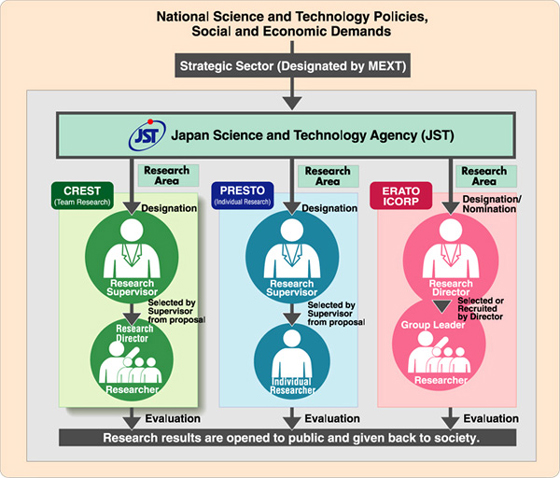- JST Home
- /
- Strategic Basic Research Programs
- /
 CREST
CREST- /
- About The Program
- /
- JST Basic Research Program
JST Basic Research Program
JST Basic Research Programs
The Basic Research Programs at JST focus on fundamental research areas that help developing technological breakthroughs, which in turn lead to the advance of S&T and creation of new industries. The programs also encourage researches that trigger, through innovations, reformation of social and economic structures.
To begin with, JST defines the scope of each research area in accordance with the nation's prioritized Strategic Objects formulated by MEXT. Then, research themes for each area are openly called for, screened and finalized after interview with applicants. The research on an adopted theme is conducted by the researcher who presented the theme. For some research areas, Research Supervisors designated by JST form their own teams and carry out studies under the direction and management of the Supervisors.
In either case, research performance is evaluated and output is published with a view to returning the fruits of research to tax payers.
About JST Basic Research Programs
The Basic Research Programs are JST's major undertaking to promote fundamental research in top-down method towards the accomplishment of the nation's Strategic Objects.
The programs aim to produce technological seeds that contribute to reformation of industries and society. Front-line researchers at universities, public and private institutes join the programs by forming temporary cross-institute research consortium as required.
Although the history of the Basic Research Programs is not long, we already saw more than a couple of successful commercialization of the research output such as amorphous metals and red light emitting diode (LED). In 2007 the research on Induced Pluripotent Stem (iPS) cell by Prof. Shinya Yamanaka of Kyoto University attracted a heap of attention worldwide. His research has been conducted under the support of JST's CREST funding program.

Chronology of JST Basic Research Programs
- October 1981
- JRDC launches Exploratory Research for Advanced Technology (ERATO)
- October 1989
- Start of the International Cooperative Research Project (ICORP)
- October 1991
- Start of Precursory Research for Embryonic Science and Technology 21 (PRESTO21)
- October 1995
- Start of Core Research for Evolutional Science and Technology (CREST)
- October 1998
- Start of Research and Development for Applying Advanced Computational Science and Technology (ACT-JST)
- January 2000
- Start of Target-Oriented Research for Embryonic Science and Technology (TOREST)
- October 2000
- Start of Solution-Oriented Research for Science and Technology (SORST)
- July 2001
- Launch of the Research Institute of Science and Technology for Society (RISTEX)
- October 2001
- PRESTO21 and TOREST integrated into PRESTO
- April 2002
- Launch of Basic Research Programs following a reorganization of previous programs


